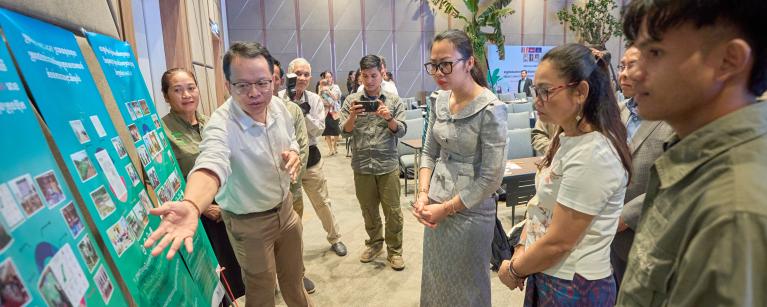Oxfam, in collaboration with local organizations, government agencies, and private sector partners, proudly marks the conclusion of the five-year Fair for All (F4A) Project today in Phnom Penh. Since its launch in 2021, F4A has driven meaningful change in Cambodia’s agricultural sector by influencing policy, amplifying community voices, and promoting inclusive governance.
Rather than focusing on isolated interventions, F4A strategically convened diverse stakeholders to address systemic challenges in the banana and rubber value chains. Through national dialogues and grassroots engagement, the project elevated the concerns of agricultural workers, prompting government commitments to strengthen labor protections and enforce social security laws. These efforts culminated in renewed inspections and oversight by the National Social Security Fund, signaling a shift toward greater accountability and worker welfare.
F4A also championed access to justice by supporting new procedures that allow individual workers to file complaints and seek resolution through formal mediation and arbitration channels. This advancement ensures that workplace grievances are addressed fairly and transparently, reinforcing the rights of agricultural laborers across six provinces including Kampot, Kampong Cham, Tboung Khmum, Kratie, Stung Treng and Ratanakiri.
The project’s influence extended to civic engagement, where it fostered constructive dialogue between communities and authorities. By surfacing local issues at the national level, F4A helped catalyze policy responses and institutional commitments to more responsive governance. Its work on responsible investment and land rights further deepened stakeholder understanding of inclusive, conflict-sensitive practices, laying the groundwork for more equitable development.
Her Excellency Vannaroth Sovann, Acting Minister of the Minister of Ministry of Labour and Vocational Training, said during her opening remarks, "While the Fair for All project has reached its conclusion, our journey toward building sustainable, inclusive trade value chains in the banana and rubber sectors is far from over. We remain steadfast in our efforts to empower smallholder farmers and agricultural workers especially women while upholding human rights and safeguarding our environment."
Ms. Sophoan Phean, Oxfam National Director, said, “Fair for All has shown that lasting change comes from collective action and courageous dialogue. By bringing workers, communities, and decision-makers together, we’ve helped shape policies that protect rights and promote equity in Cambodia’s agricultural sector."
Ms. Reasy Seng, Excutive Director at SILAKA, said, "This project empowered communities to speak up and be heard. From local farmers to national forums, we’ve seen how inclusive engagement can drive real policy shifts and strengthen democratic governance."
Climate resilience and gender equality were also central to F4A’s advocacy. Through consultations and policy papers, the project contributed to Cambodia’s national climate agenda, promoting renewable energy and inclusive adaptation strategies. Meanwhile, initiatives like “White Tear” used art and activism to spotlight women’s experiences, sparking public dialogue and advancing gender justice.
As the F4A Project concludes, its legacy is defined not by events, but by the lasting shifts it helped catalyze stronger protections for workers, empowered communities, and a more just and sustainable agricultural future for Cambodia.
